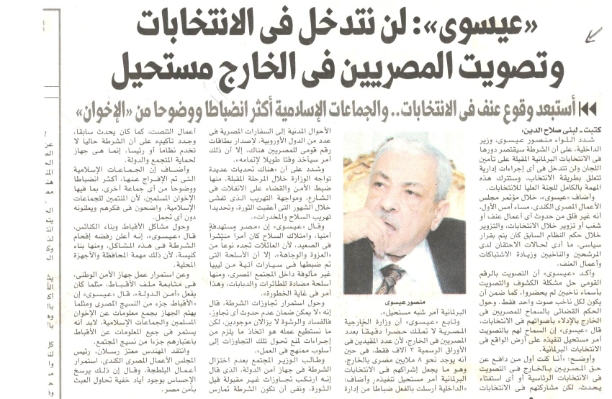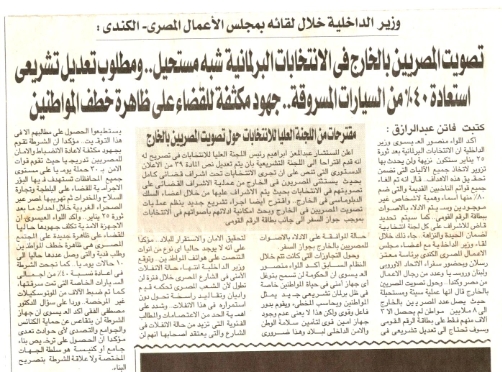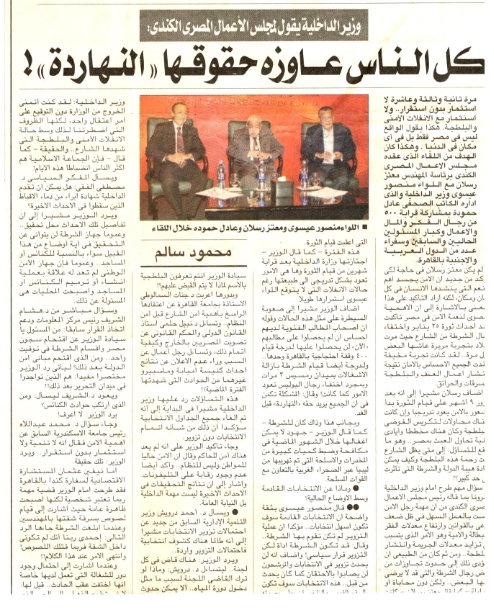
Date
Speaker(s)
Designation
Description
Egypt’s Security: What went Wrong?…Where are we Heading?
The Canada Egypt Business Council (CEBC) hosted a special event and panel discussion featuring H.E. General Mansour ElEissawy, the Minister of Interior and the prominent journalist and Editor-in-Chief of Al Fagr Newspaper, Mr. Adel Hamouda. The event was held to discuss the pressing issue of security and the ominous shadow of the frequent acts of violence and lawlessness threatening the security status of Egypt, as well as the measures taken by the ministry in securing the upcoming parliamentary elections.
The event is the sixth in a series of events addressing economic and political issues pertaining to Egypt after the revolution. The discussion covered a wide array of subjects such as the security challenges facing the country, the status of the police apparatus post-revolution, securing the parliamentary elections and Egyptian expatriates ability to vote in them.
Over 300 prominent attendees attended the event, from ministers, ambassadors, CEBC members and guests, among whom was former Minister Dr. Ibrahim Fawzy, Dr. Ahmed Darwish, Dr. Mostafa El Saiid, Dr. Hany Helal, Counselor Adly Hussein, the renowned diplomat Mostafa El Fekki, former Prime Minister Dr. Ahmed Shafik as well as the newly-appointed Canadian ambassador to Egypt, H.E. David Drake as well as ambassadors of the United Kingdom, the European Union, Lebanon and Russia.
CEBC Chairman, Mr. Motaz Raslan, delivered the opening remarks for the discussion. In his remarks, he highlighted that one has grown to understand the true value of security during the January revolution when law enforcement agents withdrew from their positions leaving citizens unprotected. He then confirmed that nine months after the revolution, the police apparatus is starting to regain its grip on matters, even though there still remains some elements of chaos. Raslan explained that the acts of violence and lawlessness seem to be a fruit of a secret scheme purposely aiming at compromising the society’s safety. “This leaves us wondering until when we will be under the mercy of thugs and their acts and how can the rule of law be reestablished”, inquired Raslan. He then pinpointed that it is particularly difficult in light of the prevailing poverty, unemployment and illiteracy, which of are a direct reason for the elevating crime rate and the prevalence of thuggery.
General Mansour ElEissawy started his speech with a total breakdown of the police after the revolution relating that to the violent attacks that took place on around 90 police buildings and stations and 1,800 police vehicle. He added that unlike the popular accords of the number of policemen in Tahrir, which different newspapers and TV channels claimed to be exceeding a million policemen, there were around 8,000 policemen in Tahrir before the 28th of January, also known as the Friday of Wrath. The General resumed saying that indeed almost all Central Security agents withdrew from their posts after that gruesome Friday. “60 police stations were broken into; prisoners were freed and almost 15,000 weapon stolen! It was terribly difficult to regain police control,” explained the General.
The minister of interior drew the attendees’ attention to the historical occurrence of similar security vacuums after numerous revolutions. He stated that in Egypt’s case, it is particularly intense due to the fact that there was a confrontation between civilian protestors and the law enforcement apparatus during the revolution. Also adding to the security vacuum, is the great number of categorical demands and demonstrations, whose initiators are convinced that it is now or never. “At a time, there were around 400 protests taking place in Cairo alone,” elaborated the minister.
Another challenge the General spoke of is the smuggling of Libyan army weaponry into Egypt. “This heavy weaponry found its way into the hands of drug and weapons smuggling gangs, which were normally gravely active, that multiplied its activity dramatically, to the extent that the police apparatus had to seek the help of the armed forces to halt their heavy smuggling activities”.
Minister ElEissawy highlighted the strong comeback the police apparatus is experiencing. He pinpointed the numerous simultaneous police campaigns taking place all over the country, going up to 30 campaigns on a daily basis. The General confirmed that some of the newly prevalent crimes as a result of the security vacuum, such as kidnapping crimes and car thefts, are successfully the subject of the police campaigns and are undergoing significant progress at the moment.
Addressing the anticipated questions on the security mayhem that is expected during the parliamentary elections, the General asserted his steadfast faith in its ease and safety, as opposed to elections in the past years. In his opinion, before the revolution, candidates imposed by the regime resorted to violence in order to maintain control over constituencies where they had no popularity, while this is no longer the case after the revolution. “As long as there is no forgery, both candidate and voter have no reason to resort to violence. Thus, it will be safer than all earlier elections,” the minister assured the attendees.
The minister of interior left the floor to the prominent journalist, Adel Hamouda, who sees that the minister is indeed in a tough situation. He elaborated saying that different powers are aimed at compromising the country’s security at the moment, and are behind many incidents such as the celebration in honor of the martyrs at the Balloon Theatre incident, the Ultras Supporters incident and finally the Maspero incident. “Be them powers that used to be in control of the country in the past or ones that are seeking to be in control in the future, we need to pay attention to them,”said Hamouda.
Hamouda resumed explaining that such a chaos is not merely a criminal issue to be dealt with by a law enforcement apparatus but primarily political. He identified that the ministry faces three main battles: the chaos in the streets, the rebellion within its lines and finally the challenge that is to achieve political stability in the country.
The prominent journalist then moderated the discussion and asked the minister some questions regarding phones tapping after the revolution and in this regard the minister affirmed that this practice has stopped.
The question and answer session was an extremely interactive one, first among the attendees to ask a question was Mr. George Ishaak, the leader of Kefaya movement and one of the key figures in the National Association for Change, who stated that he is running for a parliamentary seat in Port Said and that he was not informed as to how his campaigns and his person will be secured during the elections. Other attendees also voiced their concerns regarding the elections, stating that there are expectations that it will not go through to the end due to the lack of security. Former minister Dr. Ahmed Darwish, pointed out that when examining the matter of elections, one should beware the flaws in the system that will make forgery attempts possible, he sees that unfortunately in reference to the international standards of securing the voting process, the current system in Egypt does make it easy to forge votes. Other questions tackled how Egyptian expatriates will be able to vote in the parliamentary elections, the minister confirmed that they will be able to vote in referenda as well as in the presidential elections, yet he sees that it is logistically difficult for them to vote in the parliamentary elections due to the fact that great number of expatriates do not have a national ID number and their whereabouts are not known to any governmental entity. He further explained that if they are to be allowed to vote using passports, a legislative amendment needs to be implemented prior to that. The General also affirmed that all possible measures are taken to secure the elections.
In his answer to some of the attendees questions on the reforms that must take place in the police apparatus, the minister explained that all Egyptians have dramatically changed as a result of the revolution that stipulated a whole new order, and that the law enforcement agency is not excluded from this change. He stated that the police apparatus does not serve the regime anymore, but the people and that this is not merely a direct result to the dismantling of the State Security apparatus, but also because of the new ideology the revolution instilled in all Egyptians.
Some attendees voiced their frustration at the delay the investigations of several incidents such as the burning of the church in Imbaba and the Maspero massacre are facing. In response to that, the minister said that as the head of the ministry of interior, investigations do not fall under the domain of the ministry’s functions, it is a judicial function assigned to the General Attorney. Dr. Mostafa El Fekki directly asked the minister whether he was able to exonerate the past police apparatus from intentionally stalling and purposely failing to bring the criminals behind terrorist acts against Copts, namely, the Qedeseen Church bombing in Alexandria and the first and second Koshh incidents. In answer to that, the General said that he was not part of the apparatus back then and thus is in no place to exonerate or condemn them. The minister added that issues pertaining to building churches, as of the beginning of his tenure, are not one of the functions of the ministry of interior.
Other questions addressed issues of the chronic traffic congestion, female law enforcement agents, even mega celebrity Hany Ramzy asked a question regarding censorship on the filmmaking industry, now that State Security has been dismantled. The General answered these questions affirming that he has been calling for making the traffic police an entity that is independent of the ministry of interior. He also asserted that there are women enforcement agents in several law enforcement departments and with regards to the censorship issue he stated that the ministry of interior currently has no authority over filmmaking in any form. Other questions were concerned with law enforcement agents’ fearful conduct and how their lack of confidence after the revolution is becoming an obstacle before enforcing the law were posed and attendees called for restoring respect and self-assurance to the apparatus.
A judge among the attendees posed a question regarding securing courts that have been facing lawyers’ protests against a certain draft law in the past few days, which they believe will breach their rights, and complained that judges have not been able to enter the courts they preside over. In this regard the General explained that there is a security solution to this issue, however it is not for the betterment of the situation, because it is an issue that requires a political answer. He also sees that demonstrations for various reasons causing a halt of the activities of a certain institution cannot be dealt with by a security solution, but a political one fixing the reason why they erupt.
The police apparatus being redeemed to serving the people and thus creating a balance in the state and in the relationship between the law enforcement agency and the people, seemed to be the general vibe at the event.































